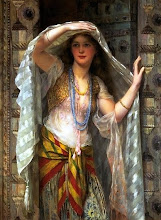
Here is an article that appeared in the Jordan Times today; my husband bought me a necklace from Al-Afghani which I consistently get compliments on. He said there are two stores, one in downtown Amman and one at the Mecca Mall. *Enjoy*
By Muath Freij
AMMAN - The Kingdom’s oldest antique shop, Al Afghani in downtown Amman, reflects the heritage of Jordan and the Arab world not only through its merchandise, but also through its own history.
By Muath Freij
AMMAN - The Kingdom’s oldest antique shop, Al Afghani in downtown Amman, reflects the heritage of Jordan and the Arab world not only through its merchandise, but also through its own history.
The story of Al Afghani began 83 years ago in the Palestinian port of Jaffa, where three brothers - Mohammed, Ahmad and Mahmoud Al Afghani - started their business selling antique souvenirs on handcarts, according to Ahmad’s son and one of the store’s current owners, Fouad Al Afghani.
“During the 1920s, Jaffa hosted many tourists since many ships from different countries came to the port,” he said.
“They turned to this craft because foreigners had no idea about oriental antiques. These souvenirs, which represented the heritage of Palestine, became popular among tourists, who would buy them whenever they came to the port.”
After a while, as demand soared among tourists, the Afghani brothers’ business boomed, and they set up their first shop in their hometown.
“They did a good job there and became popular among tourists,” 62-year-old Fouad told The Jordan Times. According to Afghani, Palestine’s volatile history during the 1930s and 1940s endangered the existence of the shop, which was burned down in 1937 and again in 1943 during periods of instability.
During the 1948-1949 war, when many Palestinians were forced to leave their homes, the Afghani family moved to Bethlehem, where they stayed for a year before relocating to Salt on the advice of a family friend.
The Afghani brothers moved their business to Amman in the 1950s, when their relative Ayoub Al Afghani encouraged them to sell goods in his shop in Souq Al Bukhariyah.
“Ayoub advised them to build on their craft, selling souvenirs, in order to make a living. So, the three brothers started selling oriental artefacts in Ayoub’s shop,” Afghani explained. During the 1950s, Afghani noted, antique items were hard to find in Amman and the trade at the time was mostly limited to the traditional Jordanian dagger known as the khanjar or shibriya.
Afghani said his father and uncles started out selling the dagger, along with various carpets and oriental antiques, noting that in the old days, the Ministry of Tourism allowed souvenir dealers to trade in antiquities, before banning the practice in 1978.
Before long, he indicated, the Afghani brothers’ business started to flourish, thanks in part to the large number of foreigners passing through Amman at the time, and in 1956, they opened their own shop near Souq Al Bukhariyah on Quraish Street (now King Talal Street).
Afghani said the street was the heart of downtown Amman and a prime location for business, as many people came from different parts of the Kingdom to get water from the Roman Nymphaeum, and the area drew many tourists because of its uniqueness.
At first, Al Afghani catered primarily to foreign tourists, as the shop’s goods were too expensive for most Jordanians at the time, he explained. “People thought these goods were designed only for tourists because of their high prices. Later on, they started buying them as presents whenever they went abroad,” Afghani added, noting that silver jewellery and accessories were the most popular items among Jordanians. Over the past half century, many shops have followed in Al Afghani’s footsteps, and today, according to Afghani, there are 240 souvenir shops all over the Kingdom.
“Unfortunately, most of the stores sell oriental handicrafts that don’t really represent the heritage of Jordan,” he noted. Although his shop also carries a range of imported items, Afghani said the true purpose of his family’s business is to help preserve the traditional crafts of Jordan and present them to the world.
“It’s not a matter of business. This shop embodies the history of our family and manifests the heritage of Jordan as well as the character of old Amman,” he said.

No comments:
Post a Comment